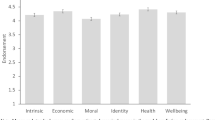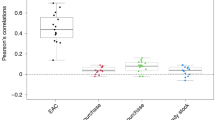Abstract
Although campaigns designed to promote pro-environmental behaviours increasingly highlight self-interest, recent research suggests that such appeals may not always be effective1,2,3. For example, individuals are more likely to check their tyre pressure when prompted with self-transcendent (that is, benefits to the environment) versus economic motives1; and, self-transcendent appeals are more likely to promote recycling behaviours than self-interested appeals2. The present experiments identify an important psychological factor that helps to explain when highlighting economic benefits will be more or less effective in encouraging pro-environmental behaviours. Specifically, we demonstrate that highlighting economic benefits (for example, the money a consumer can save) reduces consumer interest in sustainable products when individuals are in more abstract mindsets compared with when the evaluation is more immediate (that is, their mindset is more concrete). Further, we provide evidence that this shift in interest is driven by the lack of ‘fit’ between abstract thinking and economic motivations, in the context of pro-environmental behaviour.
This is a preview of subscription content, access via your institution
Access options
Subscribe to this journal
Receive 12 print issues and online access
$209.00 per year
only $17.42 per issue
Buy this article
- Purchase on Springer Link
- Instant access to full article PDF
Prices may be subject to local taxes which are calculated during checkout

Similar content being viewed by others
References
Bolderdijk, J. W. et al. Comparing the effectiveness of monetary versus moral motives in environmental campaigning. Nature Clim. Change 3, 413–416 (2013).
Evans, L. et al. Self-interest and pro-environmental behavior. Nature Clim. Change 3, 122–125 (2012).
Thøgersen, J. Inducing green behavior. Nature Clim. Change 3, 100–101 (2013).
Trope, Y. & Liberman, N. Construal-level theory of psychological distance. Psychol. Rev. 117, 440–463 (2010).
Trope, Y. & Liberman, N. Temporal construal. Psychol. Rev. 110, 403–421 (2003).
Meyvis, T., Goldsmith, K. & Dhar, R. The importance of the context in brand extension: how pictures and comparisons shift consumers’ focus from fit to quality. J. Mark. Res. 49, 206–217 (2012).
Freitas, A. L., Gollwitzer, P. & Trope, Y. The influence of abstract and concrete mindsets on anticipating and guiding other’s self-regulatory efforts. J. Exp. Soc. Psychol. 40, 739–752 (2004).
Eyal, T. & Liberman, N. in The Social Psychology of Morality: Exploring the Causes of Good and Evil (eds Mikulincer, M. & Shaver, P. R.) 185–202 (Herzliya Series on Personality and Social Psychology, American Psychological Association, 2012).
Agerström, J. & Björklund, F. Moral concerns are greater for temporally distant events and are moderated by value strength. Soc. Cogn. 27, 261–282 (2009).
Eyal, T., Sagristano, M. D., Trope, Y., Liberman, N. & Chaiken, S. When values matter: expressing values in behavioral intentions for near vs. distant future. J. Exp. Soc. Psychol. 45, 35–43 (2009).
Giacomantonio, M. et al. Psychological distance boosts value-behavior correspondence in ultimatum bargaining and integrative negotiation. J. Exp. Soc. Psychol. 46, 824–829 (2010).
Hunt, C. V., Kim, A., Borgida, E. & Chaiken, S. Revisiting the self-interest versus values debate: the role of temporal perspective. J. Exp. Soc. Psychol. 46, 1155–1158 (2010).
Torelli, C. J. & Kaikati, A. M. Values as predictors of judgments and behaviors: the role of abstract and concrete mindsets. J. Personal. Soc. Psychol. 96, 231–247 (2009).
Kivetz, Y. & Tyler, T. R. Tomorrow I’ll be me: the effect of time perspective on the activation of idealistic versus pragmatic selves. Organ. Behav. Hum. Decis. Process. 102, 193–211 (2007).
Aaker, J. L. & Lee, A. Y. ‘I’ seek pleasures and ‘we’ avoid pains: the role of self-regulatory goals in information processing and persuasion. J. Consum. Res. 28, 33–49 (2001).
Lee, A. Y. & Aaker, J. L. Bringing the frame into focus: the influence of regulatory fit on processing fluency and persuasion. J. Personal. Soc. Psychol. 86, 205–218 (2004).
Labroo, A. A. & Lee, A. Y. Between two brands: a goal fluency account of brand evaluation. J. Mark. Res. 43, 374–385 (2006).
Lee, A. Y., Keller, P. A. & Sternthal, B. Value from regulatory construal fit: the persuasive impact of fit between consumer goals and message concreteness. J. Consum. Res. 36, 735–747 (2010).
White, K., MacDonnell, R. & Dahl, D. W. It’s the mind-set that matters: the role of construal level and message framing in influencing consumer efficacy and conservation behaviors. J. Mark. Res. 48, 472–485 (2011).
Förster, J., Friedman, R. S. & Liberman, N. Temporal construal effects on abstract and concrete thinking: consequences for insight and creative cognition. J. Personal. Soc. Psychol. 87, 177–189 (2004).
Griskevicius, V. et al. When the economy falters, do people spend or save? Responses to resource scarcity depend on childhood environments. Psychol. Sci. 24, 197–205 (2013).
Auger, P., Burke, P., Devinney, T. M. & Louviere, J. J. What will consumers pay for social product features? J. Bus. Ethics 42, 281–304 (2003).
Auger, P. & Devinney, T. M. Does what consumers say matter? The misalignment of preferences with unconstrained ethical intentions. J. Bus. Ethics 76, 361–383 (2007).
Carrington, M. J., Neville, B. A. & Whitwell, G. J. Why ethical consumers don’t walk their talk: towards a framework for understanding the gap between the ethical purchase intentions and actual buying behavior of ethically minded consumers. J. Bus. Ethics 97, 139–158 (2010).
Öberseder, M., Schlegelmilch, B. B. & Gruber, V. ‘Why don’t consumers care about CSR?’: a qualitative study exploring the role of CSR in consumption decisions. J. Bus. Ethics 104, 449–460 (2011).
Oppenheimer, D. M., Meyvis, T. & Davidenko, T. Instructional manipulation checks: detecting satisficing to increase statistical power. J. Exp. Soc. Psychol. 45, 867–872 (2009).
Lamberton, C. P. & Diehl, K. Retail choice architecture: the effects of benefit- and attribute-based assortment organization on consumer perceptions and choice. J. Consum. Res. 40, 393–411 (2013).
Acknowledgements
The authors would like to thank B. McShane for his assistance in conducting the meta-ANOVA required to perform an internal meta-analysis across experimental results. In addition, the authors would like to thank C. Roux and J. Savary for their thoughtful comments on the research.
Author information
Authors and Affiliations
Contributions
All authors contributed to the design of all experiments in the main text. K.G. and R.D. designed supplemental Experiments A and B. G.E.N. analysed Experiment 3. K.G. analysed all other experiments. K.G. wrote the manuscript; all authors commented.
Corresponding author
Ethics declarations
Competing interests
The authors declare no competing financial interests.
Supplementary information
Supplementary Information
Supplementary Information (PDF 1143 kb)
Rights and permissions
About this article
Cite this article
Goldsmith, K., Newman, G. & Dhar, R. Mental representation changes the evaluation of green product benefits. Nature Clim Change 6, 847–850 (2016). https://doi.org/10.1038/nclimate3019
Received:
Accepted:
Published:
Issue Date:
DOI: https://doi.org/10.1038/nclimate3019
This article is cited by
-
From past to present (for a better future): The moderating role of cognitive mindset on spillover effects in environmental behaviors
Current Psychology (2023)
-
The effects of scarcity on consumer decision journeys
Journal of the Academy of Marketing Science (2019)
-
Consumer Perceptions of the Social Vs. Environmental Dimensions of Sustainability
Journal of Consumer Policy (2017)



